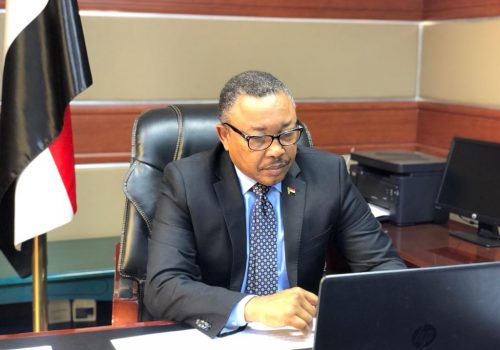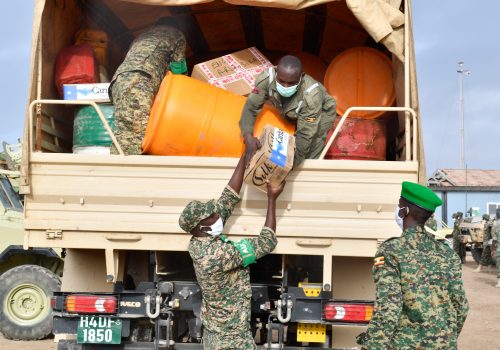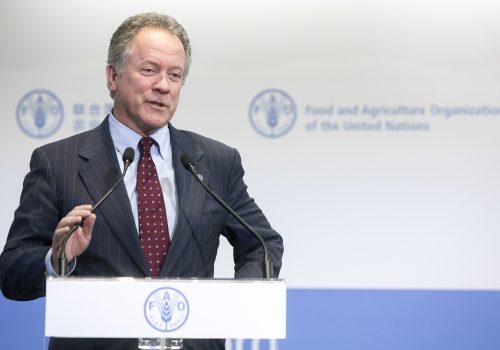Pan-African partnerships advance continental vaccine access
On Tuesday, February 23, the Africa Center hosted a panel discussion on global vaccine inequality under its Afro-Century Initiative, founded in partnership with the Africa Finance Corporation. The esteemed panel of health, finance, and advocacy leaders featured Dr. John Nkengasong, director of the Africa Centres for Disease Control and Prevention; Prof. Benedict Oramah, president and chairman of the Board of Directors of the African Export-Import Bank; Ms. Loyce Pace, president and executive director of the Global Health Council; and Mr. Samaila Zubairu, president and CEO of the Africa Finance Corporation. Moderation was provided by Africa Center Senior Fellow Ms. Aubrey Hruby, with introductory and closing remarks from Africa Center Director of Programs and Studies Ms. Bronwyn Bruton.
The speakers provided a tour de force of Africa’s COVID-19 situation and outlook, highlighting above all else the value of pan-African efforts and public-private partnerships. Remarkable progress has been made in the face of a historic challenge, but pan-African solutions and innovation will ultimately determine Africa’s COVID-19 future. Find key insights from the conversation below:
Epidemiological update: Dr. Nkengasong noted that Africa has experienced 3.8 million cases, with 101,000 deaths. The case fatality rate in the first wave was 2.2 percent but has since grown to 2.6 percent, rising above the global average. Cases are now trending down from a post-holidays peak.
Status of vaccine distribution: “A continent of 1.2 billion people has literally not started vaccinating,” said Nkengasong, emphasizing that small pockets of vaccination are no substitute for a concerted response. He underscored that Africa must reach a target of 60 percent vaccination in order to avoid remaining a “COVID continent” long after regions like the United States and Europe move on from the virus: a burden that Africa cannot bear in conjunction with other endemic health threats.
Finding supply: The African Union’s African Vaccine Acquisition Task Team’s (AVATT) principle is to “talk to all credible candidate vaccine manufacturers to bring vaccines to the continent as quickly as possible, as efficiently as possible, as cheaply as possible,” noted Prof. Oramah. He outlined that the current pool of vaccines includes Pfizer, Astra Zeneca, and Johnson & Johnson, while negotiations are being finalized to bring on the Russian Sputnik vaccine. Talks are also beginning with Chinese vaccine candidates, as well as Novavax. Initial rollout of this supply is expected in the first week of March, scaling up by the end of the month, reported Oramah.
Financing the vaccine: The African Export-Import Bank is supporting $2 billion in initial procurement guarantees, facilitating ease of financing in a “whole of Africa approach.” African states are able to pay uniform rates to access the vaccine and pay back over a period of years. This $2 billion enables access to 270 million doses under AVATT, or about 15 percent of continental demand, while the COVAX initiative aims to vaccinate another 20 percent of Africans. Notably, this still leaves a gap to reach the 60 percent benchmark.
Mobilizing the private sector: The pandemic represents “an opportunity for Africa to take ownership of its healthcare delivery system,” said Mr. Samaila Zubairu, with a central role for the private sector. The Africa Finance Corporation is supporting bold efforts to build out Africa’s manufacturing capacity, even in regards to vaccine production; to support cold chain logistics and infrastructure at African ports; and to create industrial parks that help move African markets up in the value chain.
Global advocacy: Ms. Loyce Pace argued for the need to move from a scarcity mindset to one of solidarity, expressing that there is no “either or” in the discussion of domestic versus international response. She also discussed advocates’ role in changing the narrative, which Nkengasong echoed in his calls to avoid the term “vaccine diplomacy,” saying that it ignores the human dimension and can lead to depictions of African countries as pawns in a global game for influence. Finally, Zubairu called on global advocates to support pricing guarantees, to help ensure that African countries are not forced to pay the financing premiums often faced in the capital markets.
Missed the event? Watch the webcast below and engage us @ACAfricaCenter with any questions, comments, or feedback, while keeping an eye out for future events on this topic.
Image: Photo: Pixabay


